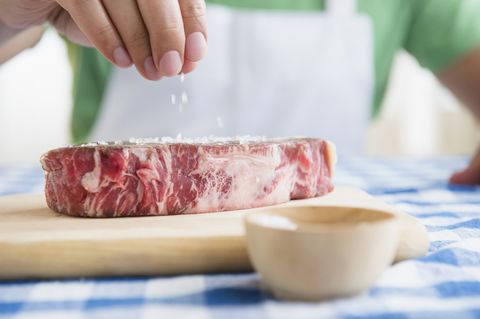Home » Diet & Food » 12 Ways to Rev Up Your Metabolism for All-Day Weight Loss
12 Ways to Rev Up Your Metabolism for All-Day Weight Loss
If your body is a machine, then your metabolism is its operating system: It takes whatever you input (food, drink, hours of sleep) and runs it through a process so that you can function. Download a bunch of junk and it runs poorly. Upgrade your daily habits and you’re running at the highest efficiency.
But also understand that one hour at the gym does not a high-performance fat-thermogenesis machine make. If you want to lose weight—and keep it off—you have to maintain an optimized metabolism all day long. Turn to this collection of the latest research to amplify your fat burn from wake-up to wind-down.
Tea Up

Getty Images
Along with coffee, tea is a rich source of antioxidants. One study published in the Journal of Research in Medical Sciences found that people with type 2 diabetes who drank four cups of green tea daily lost more weight and reduced their blood pressure more than those who drank no tea. The scientists think catechins, antioxidants inherent in green tea, may increase metabolism.
Eat Breakfast
The meal may inactivate genes involved in fat metabolism and encourage the body to burn more carbs during a workout later in the day, found a 2018 study by the University of Bath. Breakfast also raises your resting metabolic rate more than eating
the same foods at dinnertime, according to a separate study by Italian scientists.
Drink a Little Water—a Lot
Athletes on high-protein diets may show signs of metabolism-stalling dehydration. So drink up: More water may help your body break down fats more efficiently, leading to weight loss, found a review of animal studies in Frontiers in Nutrition. And drink from a smaller cup—the walk to the fountain will boost your workday activity.
Get Spicy

Getty Images
Try seasoning your morning oatmeal or shake with cinnamon. The spice may help activate thermogenesis (the production of heat by metabolism), found a 2017 test-tube study in Metabolism. It’s great on a peanut-butter-and-banana sandwich on toasted whole wheat, too.
Eat Dinner at Lunch
Per an Italian study published in PLOS One, participants who ate the bulk of their calories at dinner were twice as likely to be obese as those who ate their larger meals earlier in the day. The scientists speculate that this style of eating may sync up more naturally with circadian rhythms, which contribute to metabolic function.
Don’t Have Accidental Brunch
Men who ate larger meals less frequently throughout the day had better appetite control and a higher resting metabolic rate than those who ate the same number of calories but spread out during the day, reported a PLOS One study by Dutch scientists. Look for self-limiting snacks like one piece of fruit (apple, pear) instead of large bags or tubs, which often lead to overeating.
Go Back to Iodized Salt

Getty Images
Sea salt does not usually contain iodine, a nutrient essential for helping your thyroid keep your metabolism functioning well. Aim for 150 micrograms of iodine daily. That’s about ½ teaspoon of iodized salt, but you can also find iodine in fish, dairy, fruits, and vegetables.
Spin Your Wheels (Not Metaphorically)
A 2018 University of Copenhagen study comparing cyclists with lifters found that the bike riders had higher levels of the metabolism-boosting hormone FGF21 after training. Cap off your regular workout session on an AirBike.
Enter Burst Mode
Italian scientists found that high-intensity interval resistance training (HIRT) increased the number of calories participants burned afterward when compared with traditional resistance training. Try this workout from the study: 6 reps, 20 seconds rest, 2 or 3 reps, 20 seconds rest, 2 or 3 reps. Do 3 exercises total with 2 minutes and 30 seconds of rest in between sets for a total of 8 sets.
Strengthen your bones
A 2017 study by Canadian scientists found that people who had more of the bone hormone osteocalcin in their bloodstream had a greater ability to metabolize sugar and fat. Foods that may raise that hormone: broccoli, onions, salmon, and olive oil.
Impose a Curfew

Getty Images
Even if you’ve implemented all the tips on these pages thus far, sleeping poorly may undo your hard work. Numerous studies have shown that losing sleep can alter glucose metabolism and regulatory hormones, both of which are vital for a properly functioning metabolism.
Put Your Phone to Bed, Too
After-dark Instagram scrolling doesn’t just disrupt your sleep; it may also make you fat. The blue light your devices emit can increase insulin resistance, making it more difficult for your body to clear glucose from your bloodstream, found a Northwestern University study.
This story was adapted from Men’s Health UK.
Source: Read Full Article
-
 Martha Stewart Just Told Us Her Favorite No-Cook Summer Dinner Recipe & We Can't Believe How Easy It Is
May 19, 2021
Martha Stewart Just Told Us Her Favorite No-Cook Summer Dinner Recipe & We Can't Believe How Easy It Is
May 19, 2021 -
 The Crazy Food Fight Over The Future of Vegetables
Mar 28, 2019
The Crazy Food Fight Over The Future of Vegetables
Mar 28, 2019 -
 If Keto And Carb Cycling Had A Baby It Would Be 'Keto Cycling'—Here's What To Know About It
Oct 16, 2019
If Keto And Carb Cycling Had A Baby It Would Be 'Keto Cycling'—Here's What To Know About It
Oct 16, 2019 -
 A lot of fat, little fat, what’s wrong now?
Mar 4, 2019
A lot of fat, little fat, what’s wrong now?
Mar 4, 2019